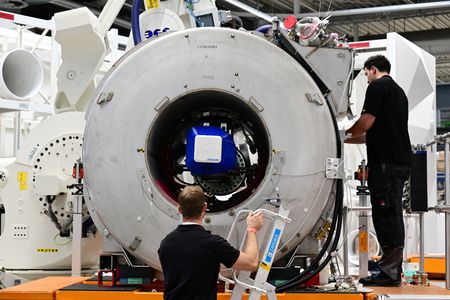By James Davey
LONDON (Reuters) -British retailer Marks & Spencer forecast “further progress” in the rest of its financial year after reporting a better-than-expected 17.2% rise in first-half profit, helped by market share gains, adding to evidence its latest turnaround plan is working.
After over a decade of failed revival efforts, M&S under CEO Stuart Machin is reaping the rewards of a costly programme to improve the value and quality of its food and clothing, overhaul its store estate, upgrade its technology and e-commerce operations and modernise its supply chain.
Shares in M&S were up over 3% in early trading Wednesday, taking gains over the last year to 76%.
The group said it made profit before tax and adjusting items of 407.8 million pounds ($524.6 million) in the six months to Sept. 28 – ahead of analysts’ consensus forecast of 361 million pounds and the 348.1 million pounds made in the same period last year.
Revenue rose 5.7% to 6.48 billion pounds, with food sales up 8.1% and clothing and homeware sales up 4.7%.
“In the first five weeks of the second half overall trading remains on track and we are confident of making further progress in the remainder of the year,” M&S said.
Last week clothing rival Next raised its profit outlook after better-than-expected recent trading, while Primark said on Tuesday it expected good Christmas trading.
M&S did, however, caution that in the first half its cost inflation ran well ahead of overall inflation and the consumer environment was uncertain. It expects that backdrop to persist in the second half.
Machin also described as “for now uncertain” the impact the new Labour government’s recent budget would have on M&S, its suppliers and customers. The budget raised taxes and the minimum wage for workers.
“Despite our strong trading momentum, there is much more opportunity for future growth and that energises us,” said Machin.
Prior to Wednesday’s update, analysts were on average forecasting full year profit before tax and adjusting items of 780 million pounds, up from 716.4 million pounds in 2023/24.
(Reporting by James Davey, Editing by Paul Sandle and Tomasz Janowski)











